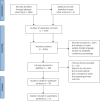A systematic review and meta-analysis of the traumatogenic phenotype hypothesis of psychosis
- PMID: 39118412
- PMCID: PMC11698141
- DOI: 10.1192/bjo.2024.52
A systematic review and meta-analysis of the traumatogenic phenotype hypothesis of psychosis
Abstract
Background: Developmental trauma increases psychosis risk and is associated with poor prognosis. It has been proposed that psychosis in survivors of developmental trauma gives rise to a distinct 'traumatogenic' phenotype.
Aims: Given the implications for personalised treatment, we sought to explore the traumatogenic psychosis phenotype hypothesis in a systematic review and meta-analysis of studies comparing psychotic presentations between adults with and without developmental trauma histories.
Method: We registered the systematic review on PROSPERO (CRD42019131245) and systematically searched EMBASE, Medline and PsycINFO. The outcomes of interests were quantitative and qualitative comparisons in psychotic symptom expression (positive, negative, cognitive) and other domains of psychopathology, including affect regulation, sleep, depression and anxiety, between adults with and without experience of developmental trauma.
Results: Of 34 studies included (N = 13 150), 11 were meta-analysed (n = 2842). A significant relationship was found between developmental trauma and increased symptom severity for positive (Hedge's g = 0.27; 95% CI 0.10-0.44; P = 0.002), but not negative symptoms (Hedge's g = 0.13; 95% CI -0.04 to 0.30; P = 0.14). Developmental trauma was associated with greater neurocognitive, specifically executive, deficits, as well as poorer affect, dissociation and social cognition. Furthermore, psychotic symptom content thematically related to traumatic memories in survivors of developmental trauma.
Conclusions: Our findings that developmental trauma is associated with more severe positive and affective symptoms, and qualitative differences in symptom expression, support the notion that there may be a traumatogenic psychosis phenotype. However, underdiagnosis of post-traumatic stress disorder may also explain some of these findings. More research is needed to explore this further.
Keywords: Trauma and stressor-related disorders; childhood experience; phenomenology; psychosis; schizophrenia.
Conflict of interest statement
None.
Figures



References
-
- Barrigón ML, Diaz FJ, Gurpegui M, Ferrin M, Salcedo MD, Moreno-Granados J, et al. Childhood trauma as a risk factor for psychosis: a sib-pair study. J Psychiatr Res 2015; 70: 130–6. - PubMed
-
- Bechdolf A, Thompson A, Nelson B, Cotton S, Simmons MB, Amminger GP, et al. Experience of trauma and conversion to psychosis in an ultra-high-risk (prodromal) group. Acta Psychiatr Scand 2010; 121(5): 377–84. - PubMed
-
- Bloomfield MAP, Buck SC, Howes OD. Schizophrenia: inorganic no more. Lancet Psychiatry 2016; 3(7): 600–2. - PubMed
Publication types
Grants and funding
LinkOut - more resources
Full Text Sources

